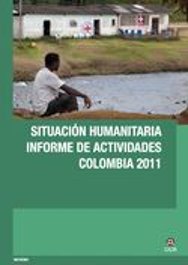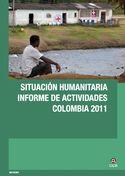Bogota (ICRC) – Violations of humanitarian law, including forced displacement, threats of violence, rape and damage to civilian objects, have increased in Colombia, the International Committee of the Red Cross (ICRC) has found. In presenting its report today on its activities in Colombia in 2011, the ICRC seeks to remind all parties to the conflict of the importance of strictly respecting the rules of international humanitarian law.
"We’re concerned about the deteriorating situation in some areas,” said Jordi Raich, head of the ICRC delegation in Colombia. In many cases, he noted, fighting has intensified, making it harder for remote communities to obtain basic services such as health care, education, clean water and transportation. “We’re very concerned to see that many people living in ‘the other Colombia’ are increasingly fading from public view.”
Visit : Colombia report 2011 - humanitarian action
Interview with the head of Colombia delegation
In 2011 the ICRC documented more than 760 alleged violations of international humanitarian law and other basic standards committed by all parties to the conflict in Colombia. More than 150,000 people benefited directly from the ICRC’s work. The organization provided emergency aid for displaced people, access to health care, and support for local infrastructure projects. It helped return the bodies of the dead to their families, paid funeral expenses, moved people to safer places when they were threatened, and facilitated the release of hostages held by armed groups. ICRC delegates also visited detainees. In many cases, these activities were carried out in collaboration with the Colombian Red Cross.
The regions affected by an upsurge in violations were: Cauca, Nariño, Chocó, Antioquia, Córdoba, Putumayo, Caquetá, Meta, Guaviare and Norte de Santander. In cities such as Medellín, Tumaco and Buenaventura, people are suffering from the effects of the conflict and other organized violence.
"Armed men came into my house,” said one of the victims helped by the ICRC in 2011. “I was alone with my 10-year-old son. They started accusing me of collaborating with the other side and said I had to tell them what I knew. Then three of them raped me. The others did nothing – they just watched. When it was all over, my son and I fled to the city. We walked for 12 hours.”
The ICRC also documented cases in which aerial spraying of illegal crops destroyed the legal crops on which communities in conflict areas depend, depriving them of food and a means of livelihood.
In 2012 the ICRC will continue working in isolated areas of Colombia. The recognition it enjoys as a neutral, impartial and independent organization will enable the ICRC to respond effectively to the needs of victims in these areas. In particular, the ICRC will endeavour to raise awareness about violence affecting health care, including attacks on patients, medical workers and facilities, and medical vehicles.
Through its delegation in Bogota and its offices in nine other Colombian cities, the ICRC will also continue to address the consequences of other forms of violence in urban areas.
For further information, please contact:
María Cristina Rivera, ICRC Colombia, tel. +57 311 491 07 75
Pascal Jequier, ICRC Colombia (information in English and French), tel. +57 311 491 07 89
Colombia report 2011 - humanitarian action
Throughout 2011, the people of Colombia continued to suffer the effects of the armed conflict that started almost 50 years ago. The conflict is still having serious consequences, and this report calls for scrupulous application of humanitarian standards.
Contents
- 2011: calling for respect for humanitarian rules
- Editorial: the other Colombia – heading for oblivion?
2011: calling for respect for humanitarian rules
 In 2011, Colombians continued to suffer the effects of an armed conflict that has persisted for almost 50 years, the longest in the Western hemisphere. The impact of this conflict is as serious and significant today as it has always been. The call for compliance with and strict implementation of humanitarian rules, which runs through each section of this report, is therefore current, necessary and relevant.
In 2011, Colombians continued to suffer the effects of an armed conflict that has persisted for almost 50 years, the longest in the Western hemisphere. The impact of this conflict is as serious and significant today as it has always been. The call for compliance with and strict implementation of humanitarian rules, which runs through each section of this report, is therefore current, necessary and relevant.
During the year, the ICRC witnessed first-hand the harshness and horrors of the armed conflict and of other forms of violence in various parts of the country. It recorded more than 760 violations of international humanitarian law (IHL) and of other basic rules protecting human life, with a worrying rise in the numbers of people displaced, in sexual violence, and in attacks on civilian property.The figures set out in the following pages are merely a reflection of the situation in more than 20 regions of Colombia where the ICRC’s humanitarian activities are focused, but they may also be indicative of national trends.
Download Colombia report 2011, full text in Spanish (PDF).
Extracts:
- Murder and death threats
- Disappearance
- Involving minors in conflict
- People deprived of their liberty
- Legal crops affected by aerial spraying of coca
In 2011, the ICRC registered an intensification of the fighting and its consequences for victims in the following departments: Cauca, Nariño, Antioquia, Córdoba, Putumayo, Caquetá, Meta and Guaviare and, in the final months of the year, Norte de Santander. In addition, in cities such as Medellín, Buenaventura and Tumaco, the effects of the armed conflict were compounded by other forms of organized violence, adding to the population's suffering.
Departments such as Cauca, Nariño, Putumayo and Caquetá have been the setting for fighting, military operations, and attacks. The same has been true of some towns in the Catatumbo region in Norte de Santander. As stipulated in international humanitarian law, the parties to a conflict have a duty to respect the principles of distinction, precaution and proportionality in order to spare civilians, their property, and other persons protected under IHL, such as those who are sick, wounded or no longer taking part in hostilities.
In addition to these areas, where the clashes were focused, there were others that, owing to the presence of armed fighters, suffered the indirect consequences of a long-entrenched conflict. Their inhabitants had trouble accessing basic services such as health care, education, water and transport and faced stigmatization for being seen to collaborate with one side or another. These areas are not the scene of daily clashes but they do experience murders, threats and sexual violence, among other violations, that go unreported. The humanitarian needs there are further intensified by the neglect, indifference and weak presence of State social institutions.
Despite the State's efforts to contain the problem, the consolidation of emerging armed groups (called "Bacrim" by the government) in Antioquia, Córdoba, Chocó, Nariño and several departments along the Caribbean coast have caused the situation to deteriorate in humanitarian terms. Other groups operating outside the law in cities such as Medellín and Buenaventura have exacerbated it further.
In these cities, there are neighbourhoods that are difficult to access and are controlled by armed gangs. Setting aside the lengthy semantic discussions of the distinction between "armed conflict" and "other situations of violence" (the latter mainly being the result of organized crime), the humanitarian repercussions of both phenomena are practically identical for the population. They include loss of life, displacement, disappearance, sexual abuse and recruitment of minors.
Humanitarian response
This report describes the main problems affecting the population in 2011 in the different areas of Colombia where the ICRC operates. It also highlights the ICRC's concern for people deprived of their freedom, regarding both the well-being of those held by armed groups and the conditions of detention of those detained in State facilities.
Beyond describing the impact on victims, the report includes reliable accounts that underline the chronic nature of the violence and testify to the ICRC's humanitarian response aimed at relieving people's suffering and restoring their dignity.
The ICRC's humanitarian action is focused in three basic areas: protection, assistance and prevention. Protection work involves addressing direct violations of humanitarian rules by approaching the alleged perpetrators, which the ICRC can do thanks to the confidential dialogue it maintains with all armed actors. Assistance means delivering aid directly and facilitating access to basic services for victims and communities in areas affected by violence. Prevention is about promoting respect for and implementation of IHL and of other humanitarian rules.
These tasks could not be carried out without the support of the Colombian Red Cross, which is the ICRC's strategic partner in the country. By joining forces, the two organizations can extend the coverage of their activities and reach many more people in need.
Lastly, each section of this report makes reference to IHL and conveys a specific message, calling upon all armed actors to mitigate the effects of the conflict and other forms of violence. They are urged to spare civilians, those who lay down their arms, the wounded and the sick. In short, this report is an exhortation to abide by the international principles that have guided conduct in wartime since the end of the nineteenth century – IHL.
